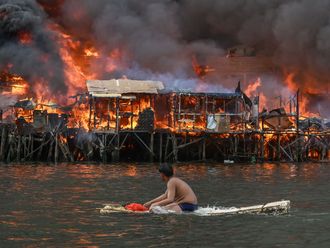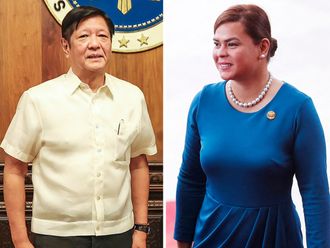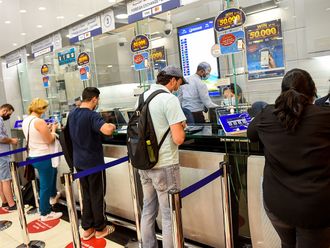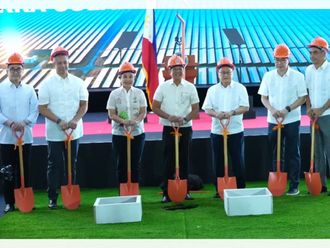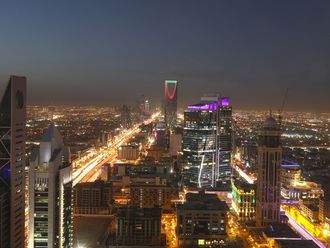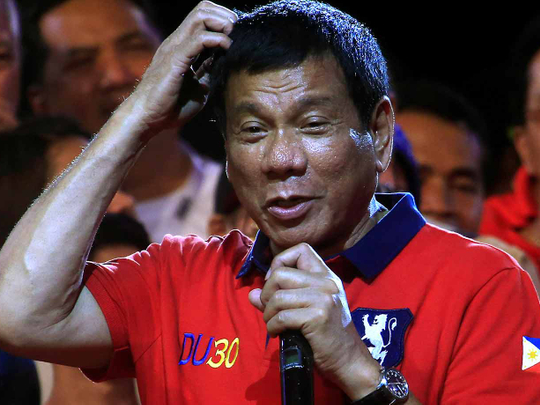
Manila: Convicted drug lords detained at a national penitentiary in Metro Manila’s suburban Muntinglupa have raised P20 million (Dh1.6 million) for the assassination of incoming President Rodrigo Duterte, his newly appointed police chief said Wednesday.
Both Duterte and Police Chief Superintendent Ronald ‘The Rock’ dela Rosa have waged a campaign to end drug trafficking in the Philippines in three to six months.
“I received information that drug lords currently in National Bilibid Prison (NBP) met and agreed to match the P5 million offered by Mayor Duterte per slain drug lord, and P4.9 million per arrested drug lord,” Dela Rosa said.
“We [Duterte and dela Rosa] will be the target. I tell them, come on down, bring it on,” said dela Rosa, adding, “When we assume office on June 30, let’s see if you can still pay [for our assassination].”
In a raid at the NBP in December 2014, the National Bureau of Investigation found that detained drug lords (a group called ‘Bilibid 19’) continued their illegal drugs business with the help of gang members and corrupt jail wardens.
“There are persistent reports that large amounts of methamphetamine hydrochloride or shabu being peddled in the country come from NBP where Chinese drug lords along with their Filipino cohorts are detained,” said an NBI officer who was part of the raid.
At the time, convicted drug lord Ruben Tiu revealed that small laboratories that manufacture methamphetamine hydrochloride at the NBP were the sources of his drugs trade at Sablayan Prison and Penal Farm in Occidental Mindoro, southern Luzon.
To punish the drug lords, the justice department transferred them to the NBI’s jail in Manila in January 2015. The NBI also dismantled the shabu laboratories at the NBP. And the convicted drug lords were brought back to NBP’s refurbished building in August 2015.
“This is a true prison for them,” said Bureau of Corrections director Ricardo Rainer Cruz, referring to Jojo Baligad, Amin Imam Boratong, Joel Capones, Rommel Capones, Eugene Chua, Tom Chua, Willy Chua, Peter Co, Herbert Colangco, Chua Sam Li, Benjamin Ma, Noel Martinez, Michael Ong, Willy Sy, Vincent Sy, Jacky King Sy. German Agojo was confined in a hospital. Another convicted drug lord offered to become a state witness, was enrolled at the government’s Witness Protection Programme.
“We assigned the right guys, the right supervisors at the building where they were brought. The goal is to make NBP a completely drug-free facility,” said former justice secretary Leila de Lima who was elected senator last May 9. The government is now building a new prison facility in Nueva Ecija, northern Luzon, she added.
Apart from targeting foreign and local drug lords, incoming PNP head dela Rosa vowed that scallywags will be booted out from the Philippine National Police (PNP), and higher officials involved in illegal drugs trade will also be punished.
Narco-politics is well entrenched in the Philippines, sources said, adding that leaked reports have identified congressmen from southern Luzon; a provincial governor; a village councillor in Iloilo, central Philippines; and officials of the Philippine Drug Enforcement Agency (PDEA) who were allegedly involved in illegal drugs trade.
The illegal trade amounted to $8.4 billion in 2013.
Chinese nationals are notorious shabu-makers in the Philippines. The Mexico-based Sinaloa drug cartel and Africa-based group have been smuggling shabu into the Philippines for distribution in Southeast Asia.
About 20.51 per cent or 8,629 villages out of 42,065 villages nationwide are plagued with drug menace. About 92.10 per cent of villages in Metro Manila and 33.78 per cent of villages in southern Luzon have drug problems.


